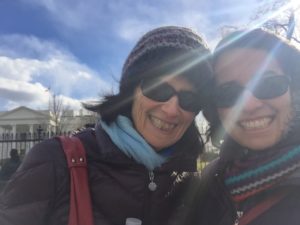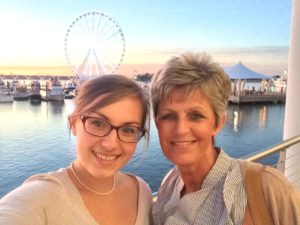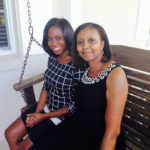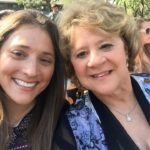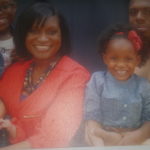Today is Mother’s Day and we thought it would be a good time to hear from some inspired moms who raised the next generation of young leaders and learn about their perspective on their children’s careers and on public service in general.
Joni Pfeffer’s daughter Danielle is a YGL member from the Greater Kansas City Chapter. Janice McKoy’s daughter Doniella serves on the YGL National Board while Janice Nealy’s daughter Ashley is President of the YGL Atlanta Chapter. Carol Zur’s daughter Julia is a new employee at the Department of Health and Human Services working in Rockville, Maryland and Branka Balac’s daughter Jovanka serves on the YGL National Board.
When asked, what do you say your child does?
Joni: “I tell them proudly that she works for OSHA and she’s a whistleblower investigator.”
Janice M: “She’s an emergency manager for the New York City Office of Emergency Management. I wouldn’t say I have details, but overall I know she pulls different agencies together in an emergency. She protects people.”
Janice N: “She works for Treasury and she works in IT. I know she does the website, and she talks about tickets from people.”
Carol: “She works for SAMSHA. She works at HHS with opioid research and projects related to financing health services.”
Branka: “She’s working for the government. I don’t know what, but every time I talk to her, she’s happy and she’s smiling, so I assume she likes it.”
Why is the work they do important?
Joni: “She helps people who are the underdog and are trying to do the right thing. It’s helping people who’ve been wronged.”
Janice M: “Any kind of essential service that protects people, if it’s a civic duty, I think it’s important.
Janice N: “She keeps the public informed and makes sure they have the information they need.”
Carol: “So many people need behavioral, mental health, and addiction services and it’s not a high priority for the powers that be. Hopefully the work she does will have an impact on the funding of social services.”
Branka: “I can see how she’s taken care of, that she likes what she does—not just likes, but values what she does—and she has a lot of possibilities. That’s what ‘important” means to me, taking care of her.”
What did they want to be when they grew up?
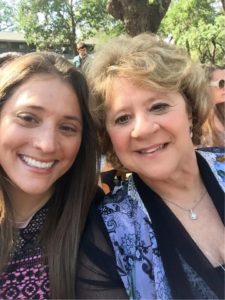 Joni: “I don’t remember now. I remember talking to her about being a lawyer because she liked to argue (laughs).”
Joni: “I don’t remember now. I remember talking to her about being a lawyer because she liked to argue (laughs).”
Janice M: “I think she wanted to be an anesthesiologist for a really long time until her guidance counselor talked her out of it.”
Janice N: “I remember at one time she wanted to work on animated movies, like Disney movies.”
Carol: “Once she was in high school, and certainly in college, she had a real soft spot for homeless people. She wanted to do something to help them, and the mentally ill among them, but she wasn’t sure in what way.”
Branka: “I remember she was always saying she was going to be a a brain surgeon. She said she wanted to operate on her aunt and I. I didn’t worry, because she was scared of blood.”
Do they like their job? Why?
Joni: “She loves her job. It’s mentally stimulating. We used to call her ‘the rule police’ when she was a kid. Now that’s what she does for a living, enforces the rules. She finds the cases interesting and each one is different.”
Janice M: “I think she does. She’s very civic-minded and wants to make a difference. In a crisis, she can try.”
Carol: “I think she’s passionate about the causes. There’s a lot of red tape though and I know that frustrates her. She is learning a lot and feels she is helping to create change for underserved populations.”
Branka: “She likes it. She’s told me many times. She’s had jobs before with a lot of pressure, and I never saw her smile.”
Has their work changed how you feel about government?
Joni: “I work for the government myself. It’s a great place to be: the pay and benefits are good and it’s a secure place to be. The other side is that the government is a huge bureaucratic organization and you have to deal with a lot of bureaucrats and bureaucratic b.s.. That trickles down and you deal with it on the front lines sometimes. As screwed up as the government can be, I believe that we have the best country out there.”
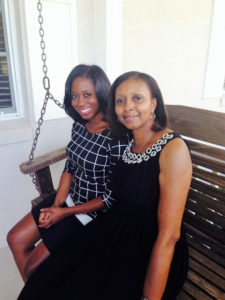 Janice M: “I think it’s scary that they don’t pay them enough. They encourage them to find a roommate! If you’re a decision-maker in a crisis, you should get paid enough to have a roof over your head. We don’t take care of people who are providing an essential service.”
Janice M: “I think it’s scary that they don’t pay them enough. They encourage them to find a roommate! If you’re a decision-maker in a crisis, you should get paid enough to have a roof over your head. We don’t take care of people who are providing an essential service.”
Carol: “Having worked in local government for many years, I am familiar with policies, politics and red tape. On the flip side, I’m also familiar with the many dedicated people working for the government who actually are able to institute change. I think she’s observed the same.”
Branka: “In the government, you have a job and you aren’t scared. One day I might come in to work and not have a job. If I was younger, I’d be looking for a government job.”
What do you hope your child gets out of their career in public service?
Joni: “I see her as a leader. I’d love to see her rise up in administration. She’s one of the fairest people I’ve ever known and I want to see her get what she deserves.”
Janice M: “Are you kidding me? I still haven’t figured out what I want to do! I’m sure that she’ll still be doing something that helps people’s lives. I don’t see her stopping that. She’s a very tenacious person.”
Janice N: “I hope she can get into a leadership position one day. She does a lot of training in leadership and so I think she’d like to follow that path. She has a lot of activities outside of work and she’s always taking the lead. She makes sure to get things done. I don’t know how she finds so much time in the day, but she finds the time.”
Carol: “I hope that she’s able to see some of her dreams to come to fruition. I hope she maintains her passion and enthusiasm and that she is able to impact the lives of many people. She has a wonderful work ethic and I’m confident that will remain. If she stays in the public service field, I hope she is able to take on a higher leadership role and move mountains for the underserved.”
Branka: “I came to the U.S. from Bosnia. All of the English I know is what she taught me. I never got a nice job like the one she has and I had to work and work and work to take care of my family. We’ve worked very hard to give her a chance for an education and not to want for anything. She is so smart and she’s seen so much of the world already, I am so proud of her. My goal would be that she continues doing what she likes and establishes roots in a field like that for most of her career. With all the trouble I went through to have her, and bring her here, I want her to have the best.”
We also spoke to a young leader who is a mother herself, to get her insights. Miesha is Vice President of the YGL Greater Kansas City Chapter.
What do you do?
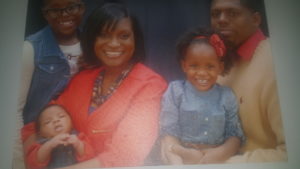 Miesha: “I work for DHS. I’m also a mother of three.”
Miesha: “I work for DHS. I’m also a mother of three.”
How old are your children? Do they understand what you do yet?
Miesha: “12, 3, and 1. The way the 12 year-old describes it, I work for the President. It’s hard to explain it to her. I think she just assumes I work all day to support her needs and wants.”
Are there things other parents working in the government have said or done which make sense to you now?
Miesha: “I was fortunate enough to work with several moms with teenagers. One of the biggest things they used to say was how important it is to cherish your time with your children. They won’t always be young; they won’t always look up to you the way they do now. I took that to heart and now I take every chance I get to spend time with them and cherish them right now.”
- Ashley and Janice Nealy
- Carol and Julia Zur
- Danielle Abbott and Joni Pfeffer
- Miesha Carr and Family
- Jovanka and Branka Balac
This article was written by Joseph Maltby.


